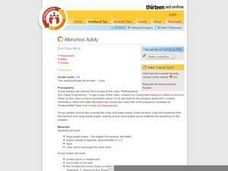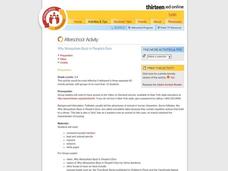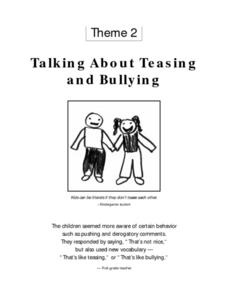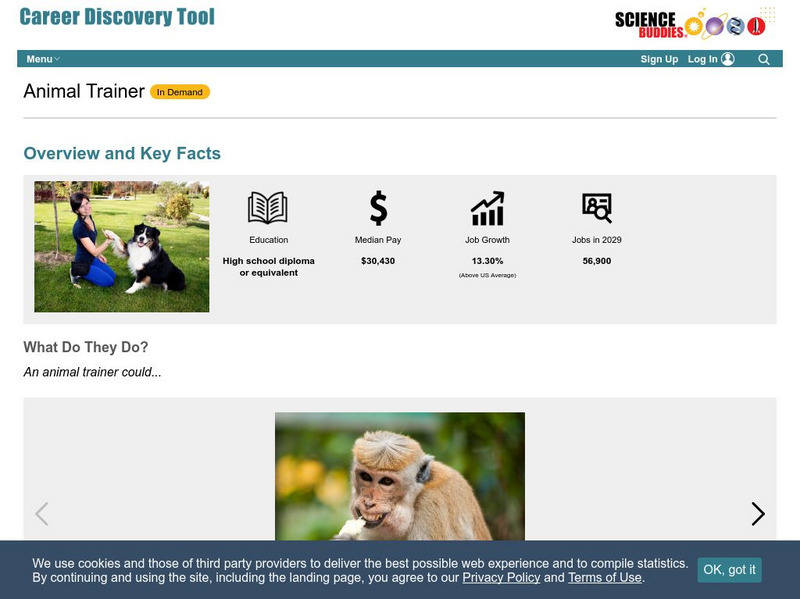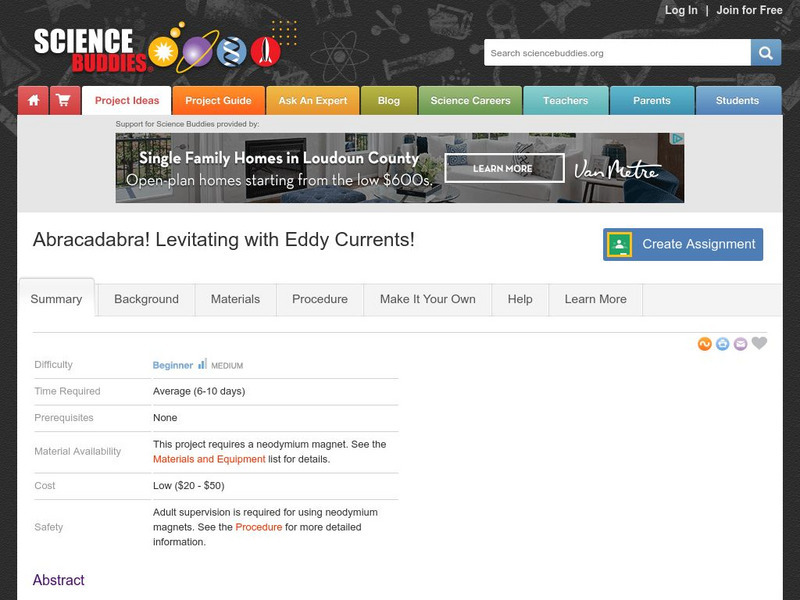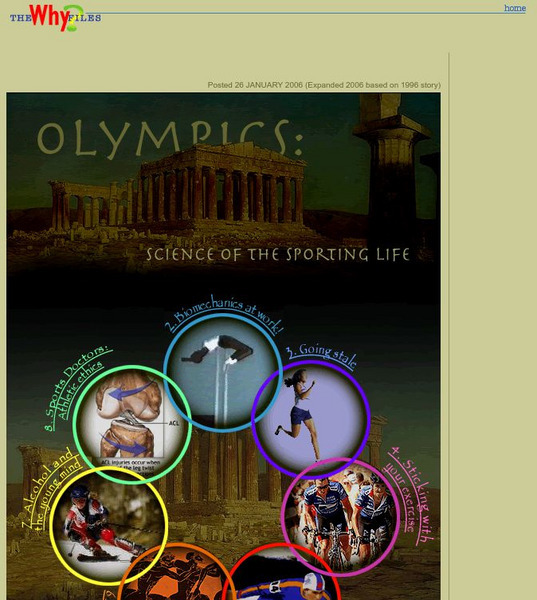Curated OER
Don't Box Me In
Students explore the relationship between flat and three-dimensional shapes. They identify the names of 3-D shapes and construct cubes from squares.
Curated OER
Identity and Religion
Students view and discuss the public television program, Wide Angle: Young, Muslim, and French. They research and write a position in favor of or against the headscarf ban in France, and examine the influence of media in shaping...
Curated OER
Won't You Celebrate With Me: The Joy of Lucille Clifton
Students explore the concept of poetry through movement and song. They watch Lucille Clifton read her poem, and write their own poem.
Curated OER
Why Mosquitoes Buzz in People's Ears
Young scholars appreciate African folktales, make "connections" between geography and literature, and research facts about Africa's animals and present findings through art and writing.
Curated OER
Talking About Teasing and Bullying
Students discover how it feels to be bullied and teased. They work together in pairs to write about experiences and use drawings to show their feelings.
Curated OER
John Marshall House
Students examine the life of John Marshall, his house and his way of life. They analyze his values and how his private life affected his public life. They also examine historical sites that commemorate notable deeds.
Curated OER
Edison National Historic Site
Students use maps, readings and photos to research and describe how Thomas Edison created the first modern laboratory complex. They simulate the process of invention and consider how technological advances have affected their own...
Curated OER
Chesapeake and Ohio Canal
Students use maps, readings, drawings, plans and photos to research and the importance of canals in the early industrial economy of America. They consider the development of the Potomac River Canal and research early transportation methods.
Curated OER
The Role of Exiles in Post-Saddam Iraq
Students study the role of exiles and refugees in Post-Saddam Iraq. Students are then asked the question: What could be some of the obstacles that exiles may encounter when working with the Iraqi civilian population?
Curated OER
Discover the Similarities: Marine Mammal Rescue
Students analyze the the similarities of their own daily schedule, processes and procedures and those used at work. They research the career of marine mammal rescue and email questions to a career expert. They construct a display and...
Curated OER
Boats Graph
Students read from the Bible about the travels of Paul, particularly the boat rides. They trace Paul's travels on a map of Asia Minor. Students review a field trip they took and make a graph showing the numbers of each type of boat they...
Curated OER
Recording Artist and MP3 Players
Students explore the concept of being a recording artist. In this recording artist lesson, students determine the costs of producing various music products such as a demo tape, 8-track tape, and a record deal. Students discuss supply,...
Curated OER
Visit My Class Wikis
Students visit the links on the blog site to learn about class wikis. In this technology integration lesson, students visit the links to view class wikis.
Science Buddies
Science Buddies: Career Profile: Athletic Trainer
Summarizes the important work of an athletic trainer. This Science Buddies site lays out the requirements needed to become an athletic trainer, as well as the education and job description. Included are interviews with people who have...
Canada Science and Technology Museum
Canada Science and Technology Museum: Background Information for Trains
Get answers to frequently asked questions about trains. For example, what is a steam train and what parts of a train make it move?
Science Buddies
Science Buddies: Career Profile: Animal Trainer
Animal trainers are needed in many circumstances. From training animals in animal parks to training service animals, there are many opportunities for those interested in this career. Science Buddies gives a good overview of what is...
Science Buddies
Science Buddies: Career Profile: Veterinary Technologist and Technician
If you love animals and would like a career working with them, but don't want to spend eight years in post-secondary training, perhaps being a veterinary technologist or technician would be of interest to you. Science Buddies offers a...
Science Buddies
Science Buddies: Career Profile: Biologist
Explore the career options of a biologist in this Science Buddies Career profile. You can work in a lab, work outdoors, conduct all kinds of research about living organisms and their relationship to their environments. Find out the...
Science Buddies
Science Buddies: Abracadabra! Levitating With Eddy Currents!
Did you know that not all trains run on tracks? Some of the world's fastest trains are magnetic levitation trains (maglev). This means that the carriage of the train is suspended over the rails with no support, but only with magnetic...
Science Buddies
Science Buddies: Tricks for Treats: How Long Does It Take to Train Your Pet?
Have you ever been to an animal show and seen a sea lion balance a ball on his nose, or a tiger jump through a hoop? Or maybe you've met dogs who can sit, fetch, shake, or beg on command. The range of tricks that you can teach animals is...
PBS
Pbs Learning Media: Dinosaur Train
Dinosaur Train sparks children's interest in life science and natural history. As they explore a variety of animals, children develop the inquiry skills and knowledge needed to help them think, talk and act like paleontologists. Choose...
E-learning for Kids
E Learning for Kids: Science: Indian Ocean: What Kind of Natural Forces Do We Recognize?
Learn about forces (push or pull), gravity, and friction in this module by training dolphins.
Science Buddies
Science Buddies: Career Profile: Pilot
Being a pilot seems like a glamorous career. Read about what kind of education you need to have to be accepted into pilot training. Included on this site is a listing of the "on the job" responsibilites of pilots of all types of...
University of Wisconsin
The Why Files: Olympics: Science of the Sporting Life
When the Winter Olympics begin we can study the science of sports: biomechanics, figure skating, high jumping, mental preparation, alcohol and athletes, sports doctors, staleness, and training in the ancient Olympics.


